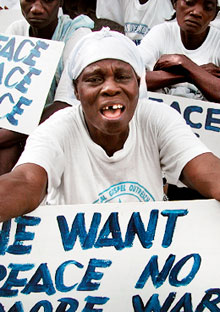The Rabble Rousers

Photo: Gabrielle Revere
PAGE 2
The Liberian civil war, which lasted from 1989 to 2003 with only brief interruptions, was the result of economic inequality, a struggle to control natural resources, and deep-rooted rivalries among various ethnic groups, including the descendants of the freed American slaves who founded the country in 1847. The war involved the cynical use of child soldiers, armed with lightweight Kalashnikovs, against the country's civilian population. At the center of it all was Charles Taylor, the ruthless warlord who initiated the first fighting and would eventually serve as Liberian president until he was forced into exile in 2003.
Gbowee was born in central Liberia but grew up in Monrovia, the country's capital. Her father was, in her words, "typical indigenous dirt-poor"; her mother came from the Americo-Liberian elite. Over the years, the family saw the worst of the sectarian violence. One day in 1990 Gbowee and her mother were at one of the city's Lutheran churches, where 2,000 internally displaced persons (IDPs) were being sheltered. "That morning soldiers came to the church and rounded up several persons and killed them," Gbowee says. "And one of the guys told us, 'You should not stay here tonight, because the group that's coming soon will be worse than us.'" Thanks to that advice—a murderer's random act of kindness—Gbowee and her mother survived the slaughter that followed: more than 600 people cut down in a single night. "We went just two blocks away, and we could hear people screaming, crying, begging for help—an all-night massacre."
As the war continued, so did sustained campaigns of rape and mutilation. In 1996, when Gbowee's son was 3, her daughter 2, and she was five months pregnant, the fighting came so close to their home that she had to rush them all to safety, past checkpoints that fighters sometimes decorated, as she puts it, with "a fresh young head." They took shelter at her parents' three-bedroom home—along with some 50 other relatives and friends. Every morning the group came together to scrape out a meal from whatever they had. And one morning Gbowee's son told her, "I really am so hungry. I just need a piece of doughnut."
"Nuku," she said, using a pet name for her son Joshua Joseph, "I don't have a piece of doughnut to give you."
In that moment Gbowee realized that, thanks to this war, her children had lived in hunger their whole lives. The realization stuck with her. She had become a social worker in 1994, and in 1998 she began counseling former child soldiers; finally, the damage done to all of Liberia's children was more than she could bear. In 2001, she persuaded the women at her church to join her in peace marches and prayer vigils, and, when groups of Muslim women with similar sentiments heard about them and decided to follow suit, a movement was born. In 2003 Gbowee was appointed spokesperson, the one to stand before the microphones when the women marched or handed over an official resolution. At such times she felt inspired, as if what she said was "ordained by God."
Gbowee was born in central Liberia but grew up in Monrovia, the country's capital. Her father was, in her words, "typical indigenous dirt-poor"; her mother came from the Americo-Liberian elite. Over the years, the family saw the worst of the sectarian violence. One day in 1990 Gbowee and her mother were at one of the city's Lutheran churches, where 2,000 internally displaced persons (IDPs) were being sheltered. "That morning soldiers came to the church and rounded up several persons and killed them," Gbowee says. "And one of the guys told us, 'You should not stay here tonight, because the group that's coming soon will be worse than us.'" Thanks to that advice—a murderer's random act of kindness—Gbowee and her mother survived the slaughter that followed: more than 600 people cut down in a single night. "We went just two blocks away, and we could hear people screaming, crying, begging for help—an all-night massacre."
As the war continued, so did sustained campaigns of rape and mutilation. In 1996, when Gbowee's son was 3, her daughter 2, and she was five months pregnant, the fighting came so close to their home that she had to rush them all to safety, past checkpoints that fighters sometimes decorated, as she puts it, with "a fresh young head." They took shelter at her parents' three-bedroom home—along with some 50 other relatives and friends. Every morning the group came together to scrape out a meal from whatever they had. And one morning Gbowee's son told her, "I really am so hungry. I just need a piece of doughnut."
"Nuku," she said, using a pet name for her son Joshua Joseph, "I don't have a piece of doughnut to give you."
In that moment Gbowee realized that, thanks to this war, her children had lived in hunger their whole lives. The realization stuck with her. She had become a social worker in 1994, and in 1998 she began counseling former child soldiers; finally, the damage done to all of Liberia's children was more than she could bear. In 2001, she persuaded the women at her church to join her in peace marches and prayer vigils, and, when groups of Muslim women with similar sentiments heard about them and decided to follow suit, a movement was born. In 2003 Gbowee was appointed spokesperson, the one to stand before the microphones when the women marched or handed over an official resolution. At such times she felt inspired, as if what she said was "ordained by God."



